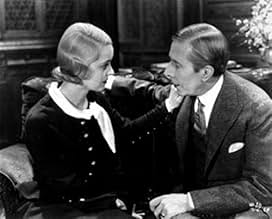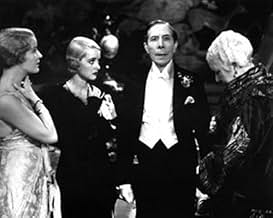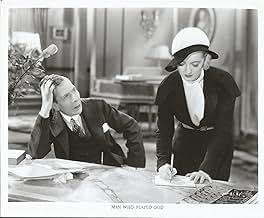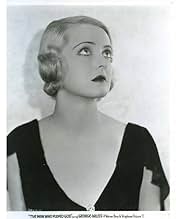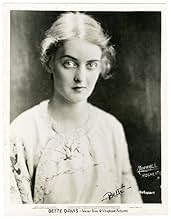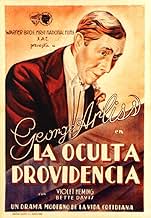AVALIAÇÃO DA IMDb
6,8/10
1,3 mil
SUA AVALIAÇÃO
Adicionar um enredo no seu idiomaAfter losing his hearing, a musician uses lip-reading to help others.After losing his hearing, a musician uses lip-reading to help others.After losing his hearing, a musician uses lip-reading to help others.
- Direção
- Roteiristas
- Artistas
- Prêmios
- 1 vitória no total
George Arliss
- Montgomery Royle
- (as Mr. George Arliss)
André Luguet
- The King
- (as Andre Luguet)
Ivan F. Simpson
- Battle
- (as Ivan Simpson)
Charles E. Evans
- The Doctor
- (as Charles Evans)
Fred Howard
- Man
- (cenas deletadas)
Symona Boniface
- Woman in Audience
- (não creditado)
Wade Boteler
- Detective
- (não creditado)
Elspeth Dudgeon
- Would-Be Ticket Buyer
- (não creditado)
Grace Durkin
- Kit - First Girl
- (não creditado)
Helena Phillips Evans
- Music Fan with Boy
- (não creditado)
Avaliações em destaque
I get so sick of people claiming that Bette Davis wasn't a beauty. She is so lovely in this 1932 film - those huge, gorgeous blue eyes, radiant smile, cute figure - she looks like a doll.
This is a wonderful melodrama which was re-made with, of all people, Liberace years later as "Sincerely Yours." All I can remember about the Liberace film is that he soft-shoed off the stage at the end, and I have a vague impression of him starting to go deaf while playing the piano.
If you can get past that the embalmed-looking George Arliss is supposed to be only 50 years old in this film (he was 64 and looks 80), it should be clear sailing from then on. Arliss was a marvelous actor, and his strong theatrical training is obvious here, as is Davis', with her clipped voice and large gestures. Film as a medium was still being learned by these actors who came from theater.
Man Who Played God is a truly beautiful story about a world-famous pianist who goes deaf and turns against his music and his religious beliefs, only to discover that every tragedy in life has meaning. 73 years later, it's still a great life lesson.
Look for Ray Milland in an uncredited role.
This is a wonderful melodrama which was re-made with, of all people, Liberace years later as "Sincerely Yours." All I can remember about the Liberace film is that he soft-shoed off the stage at the end, and I have a vague impression of him starting to go deaf while playing the piano.
If you can get past that the embalmed-looking George Arliss is supposed to be only 50 years old in this film (he was 64 and looks 80), it should be clear sailing from then on. Arliss was a marvelous actor, and his strong theatrical training is obvious here, as is Davis', with her clipped voice and large gestures. Film as a medium was still being learned by these actors who came from theater.
Man Who Played God is a truly beautiful story about a world-famous pianist who goes deaf and turns against his music and his religious beliefs, only to discover that every tragedy in life has meaning. 73 years later, it's still a great life lesson.
Look for Ray Milland in an uncredited role.
In 1932 many actors were still rather new to sound pictures and the great majority of them were theatre trained and while some would stay on in Hollywood, many would return to the stage to stay. Bette Davis was a young actress in the midst of making that decision to aty in Hollywood or return to New York and the stage. She had made several low buget pictures, but things just were not clicking for her. The success of this movie and the attention she received convinced her to stay on and make movies and we are all thankful for that. George Arliss was a grand old man of the stage and his artistry is well portrayed here. His makeup is a little heavy, making him look a little like the Phantom of The Opera with lipstick and darkened nostrils, but soon you get beyond that. The acting is almost strictly stage-style here, this MUST have been a play before it was filmed. The blocking and angles of the actors and the way they seem to talk "at" each other rather than to each other shows the stage acting. Great story, nice escapism... who wouldnt like to help others? We can do that through George Arliss in this movie.
Many of the reviews have focused on Arliss and Davis, and deservedly so. Hence there's no need to rehash that material. I want to highlight the excellent supporting cast.
Violet Heming (1895-1981) plays a suitor for Arliss. She was a British stage actress who worked with Arliss. She made few films (part of Thanhouser) and is best known for her stage work, which is unfortunate for the rest of us since her acting is really exceptional.
Louise Closser Hale (1872-1933) plays Arliss' sister and confidant. She combined a grandmotherly spirit with a quick wit and a sometimes tart edge in supporting roles ("Daddy Long Legs", "Shanghai Express", "Platinum Blonde") and her skill is probably nowhere better on exhibit than in this film.
Ivan Simpson (1875-1951) plays Arliss' manservant. He was a Scottish stage and film actor who worked with Arliss during the silent era. He made more than 100 films and later transitioned to TV. He was used extensively in the British dramas ("Prince and the Pauper", "Lloyds of London", "Captain Blood", "Mutiny on the Bounty"). This is probably the best example of his considerable talents, and the chemistry between he and Arliss is a joy to watch.
Look for Ray Milland (uncredited) in a brief scene in which he plays a man threatened with prison. For Milland (1907-86) this was his 15th film and fame was still a few years ahead. Ultimately he won an Oscar for "The Lost Weekend" (1946).
Also look for Hedda Hopper (1885-1966) as a west coast society matron. She is better known for her gossip columns, but she did, in fact, appear in over 100 films between 1916 and 1946.
This isn't a perfect film. It's a bit too long, Arliss does a few too many silent era long closeups, and the age difference between Arliss and Davis (24 vs. 65) is a bit too much. Otherwise it is a definite treat and holds up well after all these years.
Violet Heming (1895-1981) plays a suitor for Arliss. She was a British stage actress who worked with Arliss. She made few films (part of Thanhouser) and is best known for her stage work, which is unfortunate for the rest of us since her acting is really exceptional.
Louise Closser Hale (1872-1933) plays Arliss' sister and confidant. She combined a grandmotherly spirit with a quick wit and a sometimes tart edge in supporting roles ("Daddy Long Legs", "Shanghai Express", "Platinum Blonde") and her skill is probably nowhere better on exhibit than in this film.
Ivan Simpson (1875-1951) plays Arliss' manservant. He was a Scottish stage and film actor who worked with Arliss during the silent era. He made more than 100 films and later transitioned to TV. He was used extensively in the British dramas ("Prince and the Pauper", "Lloyds of London", "Captain Blood", "Mutiny on the Bounty"). This is probably the best example of his considerable talents, and the chemistry between he and Arliss is a joy to watch.
Look for Ray Milland (uncredited) in a brief scene in which he plays a man threatened with prison. For Milland (1907-86) this was his 15th film and fame was still a few years ahead. Ultimately he won an Oscar for "The Lost Weekend" (1946).
Also look for Hedda Hopper (1885-1966) as a west coast society matron. She is better known for her gossip columns, but she did, in fact, appear in over 100 films between 1916 and 1946.
This isn't a perfect film. It's a bit too long, Arliss does a few too many silent era long closeups, and the age difference between Arliss and Davis (24 vs. 65) is a bit too much. Otherwise it is a definite treat and holds up well after all these years.
THE MAN WHO PLAYED GOD (Warner Brothers, 1932), directed by John G. Adolfi, from a short story by Gouverneur Morris, stars Academy Award winning actor of 1929s DISRAELI, Mr. George Arliss, in a remake to his 1922 silent screen adaptation. Essentially a showcase for the prestigious Arliss in what might have been just another movie assignment to his credit, it's best known as the motion picture responsible for the advancement of Bette Davis in her first important screen role, following her start at Universal in 1931, thus the beginning of her long association at the Warner studio where she would become its major star attraction before the end of the decade.
Of the George Arliss films in circulation and video today, THE MAN WHO PLAYED GOD holds up remarkably well mainly due to its theme and timely message that never really grows out of date, overlooking the fact that such a story echoes passages from the Holy Bible ("A man who has never suffered has never lived," "If you kill yourself, you'll suffer ten thousand times more" or the age old question, "If God is so merciful, how could he allow this to happen to me?") preached during Sunday services. The title has nothing to do with a actor starring in a religious play, but in fact, about a man whose life becomes an "empty shell" only to change from being a troubled soul after losing his hearing to forgetting his bitterness by helping others. While much of the Arliss movies produced at Warners during the early 1930s were extremely popular, most consist of too much dialog and lack of motion to stir up interest. THE MAN WHO PLAYED GOD is one of those few that doesn't fall into that category thanks to its fine direction, screenplay and supporting players.
The story opens in Paris where 50-year-old Montgomery Royal (George Arliss), a concert pianist, engaged to his protégé, Grace Blaine (Bette Davis), a girl more than half his age, agrees to give a private backstage recital for a monarch. During a performance, an anarchist, intending to assassinate the King (Andre Luguet), explodes a bomb. While everyone has escaped injury, Monty becomes stone deaf. Monte returns to his New York City apartment where he finds it difficult to adjust to his world of silence. He becomes bitter, hating God to a point of canceling his order for an organ he was going to donate to a church in memory of his deaf and religious mother, Margaret Ruth Royal. Without the ability to hear what's precious to him, his music, and becomes an embittered recluse. Coming to the point of suicide by nearly jumping from the window, his loyal butler Battle (Ivan Simpson) saves him in time from eternal suffering by offering him something to occupy his time. Having been taught lip reading, he takes binoculars to spy on people across the street in Central Park, reads their lips, learning of their troubles, and becoming a sort of guardian angel in helping those in desperate need without revealing himself. Finding he now has a purpose in life, he must face another greater challenge involving the loyalty of young Grace.
The supporting cast consists Donald Cook as Harold Van Adam; Louise Closser Hale as Monty's sister, Florence; Oscar Apfel as the Lip Reading Teacher; Paul Porcasi as the Concert Manager; with Hedda Hopper, Murray Kinnell and the unbilled Ray Milland. Of the supporting players, second billed Violet Heming appears to be the least familiar, yet in a role that nearly surpasses the one given by Bette Davis. Her sophisticated mannerisms come close to that of the better known Verree Teasdale, as a widow who secretly loves Monty, in spite of his engagement to another. The Bette Davis trademark is not too much evident at this point, in fact, having the make-up department giving Davis the Constance Bennett manner. Davis would be paired with Arliss one more time in the rarely seen comedy, THE WORKING MAN (1933).
In the midst of horror melodramas, gangsters and pre-code sex dramas playing in theaters at the height of the great depression, THE MAN WHO PLAYED GOD comes as a sort of inspirational drama that offers hope to those who have given up on life, with the moral of the story being, "The Lord works in mysterious ways." Remade by Warners as SINCERELY YOURS (1955) with TV personality Liberace in the role originated by Arliss, whose piano playing served him better than his acting, the latest screen adaptation, that should have improved over the old, didn't, making this 1932 version the one worth viewing. THE MAN WHO PLAYED GOD, which has never been distributed to video cassette or DVD, can be seen on Turner Classic Movies. (***)
Of the George Arliss films in circulation and video today, THE MAN WHO PLAYED GOD holds up remarkably well mainly due to its theme and timely message that never really grows out of date, overlooking the fact that such a story echoes passages from the Holy Bible ("A man who has never suffered has never lived," "If you kill yourself, you'll suffer ten thousand times more" or the age old question, "If God is so merciful, how could he allow this to happen to me?") preached during Sunday services. The title has nothing to do with a actor starring in a religious play, but in fact, about a man whose life becomes an "empty shell" only to change from being a troubled soul after losing his hearing to forgetting his bitterness by helping others. While much of the Arliss movies produced at Warners during the early 1930s were extremely popular, most consist of too much dialog and lack of motion to stir up interest. THE MAN WHO PLAYED GOD is one of those few that doesn't fall into that category thanks to its fine direction, screenplay and supporting players.
The story opens in Paris where 50-year-old Montgomery Royal (George Arliss), a concert pianist, engaged to his protégé, Grace Blaine (Bette Davis), a girl more than half his age, agrees to give a private backstage recital for a monarch. During a performance, an anarchist, intending to assassinate the King (Andre Luguet), explodes a bomb. While everyone has escaped injury, Monty becomes stone deaf. Monte returns to his New York City apartment where he finds it difficult to adjust to his world of silence. He becomes bitter, hating God to a point of canceling his order for an organ he was going to donate to a church in memory of his deaf and religious mother, Margaret Ruth Royal. Without the ability to hear what's precious to him, his music, and becomes an embittered recluse. Coming to the point of suicide by nearly jumping from the window, his loyal butler Battle (Ivan Simpson) saves him in time from eternal suffering by offering him something to occupy his time. Having been taught lip reading, he takes binoculars to spy on people across the street in Central Park, reads their lips, learning of their troubles, and becoming a sort of guardian angel in helping those in desperate need without revealing himself. Finding he now has a purpose in life, he must face another greater challenge involving the loyalty of young Grace.
The supporting cast consists Donald Cook as Harold Van Adam; Louise Closser Hale as Monty's sister, Florence; Oscar Apfel as the Lip Reading Teacher; Paul Porcasi as the Concert Manager; with Hedda Hopper, Murray Kinnell and the unbilled Ray Milland. Of the supporting players, second billed Violet Heming appears to be the least familiar, yet in a role that nearly surpasses the one given by Bette Davis. Her sophisticated mannerisms come close to that of the better known Verree Teasdale, as a widow who secretly loves Monty, in spite of his engagement to another. The Bette Davis trademark is not too much evident at this point, in fact, having the make-up department giving Davis the Constance Bennett manner. Davis would be paired with Arliss one more time in the rarely seen comedy, THE WORKING MAN (1933).
In the midst of horror melodramas, gangsters and pre-code sex dramas playing in theaters at the height of the great depression, THE MAN WHO PLAYED GOD comes as a sort of inspirational drama that offers hope to those who have given up on life, with the moral of the story being, "The Lord works in mysterious ways." Remade by Warners as SINCERELY YOURS (1955) with TV personality Liberace in the role originated by Arliss, whose piano playing served him better than his acting, the latest screen adaptation, that should have improved over the old, didn't, making this 1932 version the one worth viewing. THE MAN WHO PLAYED GOD, which has never been distributed to video cassette or DVD, can be seen on Turner Classic Movies. (***)
"Of Human Bondage," (1934) by RKO, to whom Bette Davis was 'loaned' by Warner Brothers, is most often given credit for the beginning of the Queen of the Silver Screen's magnificent acting career. That's not the historical fact, however; this movie, "The Man Who Played God," (1932) must be credited for bringing Bette Davis the recognition as an actor who could hold her own in the lead next to the great screen legend, George Arliss.
Davis was only 23 years of age when filming the show that earned her enough screen status for RKO to even desire her to play the leading, (dare I say) 'lady' next to leading man, Leslie Howard in "...Bondage." Arliss is to be credited for having, more or less, discovered Bette Davis; phoned her & the rest of her acclaimed acting career began.
So many of the critiquers repeat the myth that "... Bondage" is the film that made the world recognize how great an actor Davis was. But, if it was, RKO would have never even wanted her so badly that they 'got her on loan' from the Warners! RKO recognized the talent of Bette Davis in this film: "The Man Who Played God." So should we.
Never underestimate what young adult & teen women can achieve. After all, Mary Shelley wrote "Frankenstein," when she was only 19 years of age in a bet with great poets, Lord Byron & her husband Percy Bysche Shelley. Ann & Nancy Wilson of the rock band "Heart," composed many of their best songs when they were 13 years of age! Davis had already been on Broadway before taking her role in this movie. In fact, her acting career began when she was 15 (in 1923). Davis went on (& on!) to co-lead with Lillian Gish in "Whales of August," (1987), having been in over 100 movies; was the first woman to receive an Oscar at Warner Brothers (for "Dangerous"); the first person to be nominated for an Oscar 5 years in a row; the first woman to receive the AFI's Lifetime Achievement Award; the first person to be nominated for 10 Oscars; the highest paid woman during her prime. She was the epitome of a trail blazer who had to do it "the hard way."
Today, Robert Wagner, Miss Davis's son, Michael, & Miss Davis's closest assistant are key figures who keep Bette Davis's acting excellence alive, through the foundation named after her. Meryl Streep was the first actor to benefit from Davis's foundation. Obviously, the foundation board is taking Davis's acting acumen as a serious measure by which to select recipients of foundation awards & scholarships. Davis herself was the one to recognize Streep's acting abilities.
That's what kind of lady she was: she'd take a step back on the set to boost someone else's acting career; she'd take steps forward to seek out great scriptwriters, directors, cinematographers, etc. She strove to not only circulate her own gifts, but wanted to help others people do so with theirs--and still does so. Her reputation on the set was not as a "star," struck with ego maniacal lights in her fabulously expressive eyes. Instead, she was known to be a pleasure to work with amongst the team workers; and a real tough lady to contend with when she sensed something was amiss in a line, scene, lighting, direction, or co-worker. But, as Robert Wagner tells of Davis, she was truly a fun person to work with because she "always" came to work prepared to put on her very best performance. And when she goofed, she did so with a kind of cute humility that was full of wit enough to crack-up the co-workers she liked.
There's a huge difference between striving for perfection and believing we're perfect. Davis did the former. By the way, she gave her "Jezebel" Oscar to her son, Michael. Steven Spielberg bought her "Dangerous" one that was auctioned (for the second highest price ever) to benefit her foundation. This says to me that Davis herself knew she'd really earned her "Jezebel" Oscar; whereas it was no secret that the masses believed she got the "Dangerous" Oscar as a "consolation prize" for not even being nominated for, "Of Human Bondage."
By my standards, Davis was robbed of her third Oscar for playing the role of Charlotte Vale in "Now, Voyager." In Davis's mind, she was robbed of (what would have been her fourth) Oscar for playing Baby Jane Hudson in, "What Ever Happened to Baby Jane?"
Davis herself credited George Arliss & this movie for jump starting her into untouchable acting achievements. This movie is the movie to own if we want to say we've got a copy of Bette Davis's first great one.
Davis was only 23 years of age when filming the show that earned her enough screen status for RKO to even desire her to play the leading, (dare I say) 'lady' next to leading man, Leslie Howard in "...Bondage." Arliss is to be credited for having, more or less, discovered Bette Davis; phoned her & the rest of her acclaimed acting career began.
So many of the critiquers repeat the myth that "... Bondage" is the film that made the world recognize how great an actor Davis was. But, if it was, RKO would have never even wanted her so badly that they 'got her on loan' from the Warners! RKO recognized the talent of Bette Davis in this film: "The Man Who Played God." So should we.
Never underestimate what young adult & teen women can achieve. After all, Mary Shelley wrote "Frankenstein," when she was only 19 years of age in a bet with great poets, Lord Byron & her husband Percy Bysche Shelley. Ann & Nancy Wilson of the rock band "Heart," composed many of their best songs when they were 13 years of age! Davis had already been on Broadway before taking her role in this movie. In fact, her acting career began when she was 15 (in 1923). Davis went on (& on!) to co-lead with Lillian Gish in "Whales of August," (1987), having been in over 100 movies; was the first woman to receive an Oscar at Warner Brothers (for "Dangerous"); the first person to be nominated for an Oscar 5 years in a row; the first woman to receive the AFI's Lifetime Achievement Award; the first person to be nominated for 10 Oscars; the highest paid woman during her prime. She was the epitome of a trail blazer who had to do it "the hard way."
Today, Robert Wagner, Miss Davis's son, Michael, & Miss Davis's closest assistant are key figures who keep Bette Davis's acting excellence alive, through the foundation named after her. Meryl Streep was the first actor to benefit from Davis's foundation. Obviously, the foundation board is taking Davis's acting acumen as a serious measure by which to select recipients of foundation awards & scholarships. Davis herself was the one to recognize Streep's acting abilities.
That's what kind of lady she was: she'd take a step back on the set to boost someone else's acting career; she'd take steps forward to seek out great scriptwriters, directors, cinematographers, etc. She strove to not only circulate her own gifts, but wanted to help others people do so with theirs--and still does so. Her reputation on the set was not as a "star," struck with ego maniacal lights in her fabulously expressive eyes. Instead, she was known to be a pleasure to work with amongst the team workers; and a real tough lady to contend with when she sensed something was amiss in a line, scene, lighting, direction, or co-worker. But, as Robert Wagner tells of Davis, she was truly a fun person to work with because she "always" came to work prepared to put on her very best performance. And when she goofed, she did so with a kind of cute humility that was full of wit enough to crack-up the co-workers she liked.
There's a huge difference between striving for perfection and believing we're perfect. Davis did the former. By the way, she gave her "Jezebel" Oscar to her son, Michael. Steven Spielberg bought her "Dangerous" one that was auctioned (for the second highest price ever) to benefit her foundation. This says to me that Davis herself knew she'd really earned her "Jezebel" Oscar; whereas it was no secret that the masses believed she got the "Dangerous" Oscar as a "consolation prize" for not even being nominated for, "Of Human Bondage."
By my standards, Davis was robbed of her third Oscar for playing the role of Charlotte Vale in "Now, Voyager." In Davis's mind, she was robbed of (what would have been her fourth) Oscar for playing Baby Jane Hudson in, "What Ever Happened to Baby Jane?"
Davis herself credited George Arliss & this movie for jump starting her into untouchable acting achievements. This movie is the movie to own if we want to say we've got a copy of Bette Davis's first great one.
Você sabia?
- CuriosidadesThis was the first movie Bette Davis made under her contract to Warner Bros., the studio under which she did most of her best-known work of the 1930s and '40s. Her earlier six films were made for various studios, (including Universal, RKO and Columbia) all of which let her go.
- Erros de gravaçãoWhen Royle goes to his desk after observing the couple in the park, the shadow of the boom microphone dips onto the window curtain behind him.
- Citações
Grace Blair: You're my ideal!
Montgomery Royle: I shall always be... your friend.
- ConexõesFeatured in Hollywood: The Great Stars (1963)
- Trilhas sonorasFantaisie-Impromptu in C sharp minor, Op. 66
(1834) (uncredited)
Written by Frédéric Chopin
Played on piano by George Arliss (dubbed by Salvatore Santaella) at the concert
Principais escolhas
Faça login para avaliar e ver a lista de recomendações personalizadas
Detalhes
- Data de lançamento
- País de origem
- Idiomas
- Também conhecido como
- The Man Who Played God
- Locações de filme
- Empresa de produção
- Consulte mais créditos da empresa na IMDbPro
Bilheteria
- Orçamento
- US$ 237.000 (estimativa)
- Tempo de duração1 hora 20 minutos
- Cor
- Mixagem de som
- Proporção
- 1.37 : 1
Contribua para esta página
Sugerir uma alteração ou adicionar conteúdo ausente

Principal brecha
By what name was O Homem Deus (1932) officially released in India in English?
Responda
